The Daniel Goleman's Emotional Intelligence
Added on 2022-09-13
21 Pages1870 Words19 Views
Running head: EMOTIONAL INTELLIGENCE, CULTURAL INTELLIGENCE AND
DIVERSITY
Emotional Intelligence, Cultural Intelligence and Diversity
Name of the Student:
Name of the University:
Author Note:
DIVERSITY
Emotional Intelligence, Cultural Intelligence and Diversity
Name of the Student:
Name of the University:
Author Note:
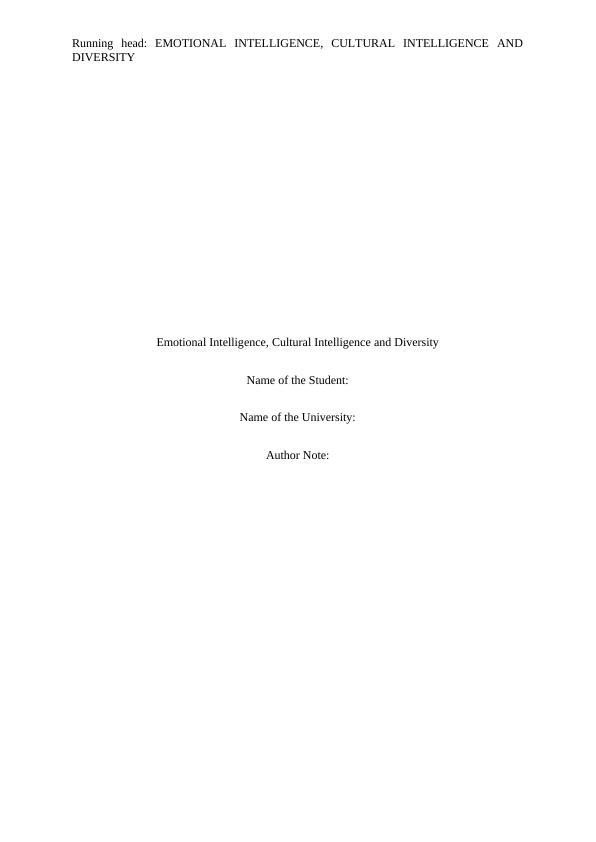
1EMOTIONAL INTELLIGENCE, CULTURAL INTELLIGENCE AND DIVERSITY
Introduction
Self-analysis and understanding the skills, competencies, strengths and weaknesses of
own self is the first step to achieve emotional and cultural intelligence as well as become a
global citizen (Arasteh, Pouragha & Norouzinia, 2018). In this essay, the Johari window has
been used as a self-assessment tool to find out the shared, hidden, blind and unknown skills
and competencies in me (Khatoon, 2018). I and two of my peers completed two emotional
intelligence tests and the result is analyzed using the results of them (Refer to Appendix).
Discussion
Analysis of the result
The Global EI test that I took showed that I had scored 6 in self-awareness, 5 in self-
management, 6 in social awareness and 4 in relationship management. When my peers took
the test for me, the peer 1 result showed that I had scored 5 in self-awareness, 5 in self-
management, 7 in social awareness and 5 in relationship management and peer 2 result
showed that I had scored 5 in self-awareness, 5 in self-management, 7 in social awareness
and 6 in relationship management. I also took the Daniel Goleman’s Emotional Intelligence
test and scored 46. When peer 1 took the same test for me I scored 43 and for peer 2, I scored
42.
In order to better understand and analyze the scores better, Johari window can be
used. There are four quadrants in the Johari window, open, blind, hidden and unknown. The
open segment includes the qualities, skills, and competencies that are both known to self and
others, the blind segment contains the aspects that are known to others but not known to self,
the hidden segment includes aspects that are known to self but not known to others while the
Introduction
Self-analysis and understanding the skills, competencies, strengths and weaknesses of
own self is the first step to achieve emotional and cultural intelligence as well as become a
global citizen (Arasteh, Pouragha & Norouzinia, 2018). In this essay, the Johari window has
been used as a self-assessment tool to find out the shared, hidden, blind and unknown skills
and competencies in me (Khatoon, 2018). I and two of my peers completed two emotional
intelligence tests and the result is analyzed using the results of them (Refer to Appendix).
Discussion
Analysis of the result
The Global EI test that I took showed that I had scored 6 in self-awareness, 5 in self-
management, 6 in social awareness and 4 in relationship management. When my peers took
the test for me, the peer 1 result showed that I had scored 5 in self-awareness, 5 in self-
management, 7 in social awareness and 5 in relationship management and peer 2 result
showed that I had scored 5 in self-awareness, 5 in self-management, 7 in social awareness
and 6 in relationship management. I also took the Daniel Goleman’s Emotional Intelligence
test and scored 46. When peer 1 took the same test for me I scored 43 and for peer 2, I scored
42.
In order to better understand and analyze the scores better, Johari window can be
used. There are four quadrants in the Johari window, open, blind, hidden and unknown. The
open segment includes the qualities, skills, and competencies that are both known to self and
others, the blind segment contains the aspects that are known to others but not known to self,
the hidden segment includes aspects that are known to self but not known to others while the
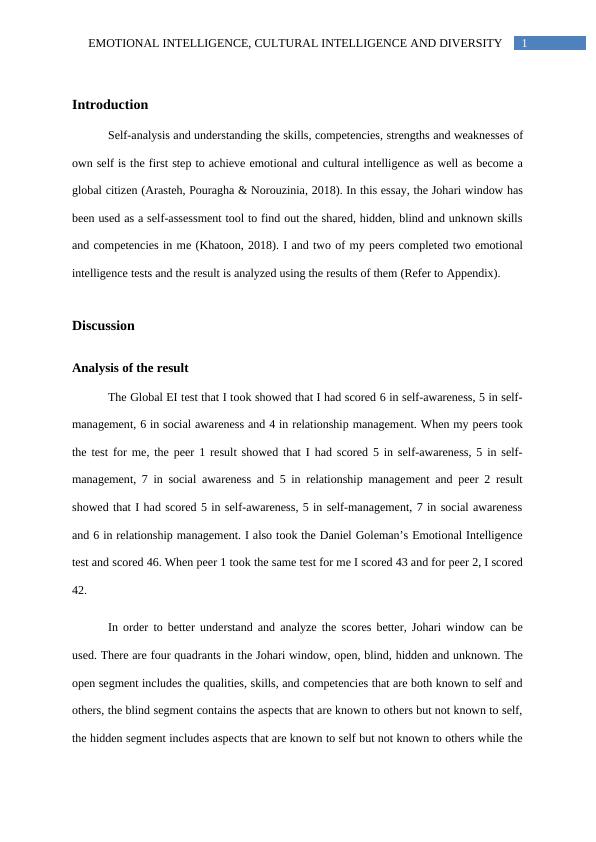
2EMOTIONAL INTELLIGENCE, CULTURAL INTELLIGENCE AND DIVERSITY
unknown segment provides the potentials for aspects that are both unknown to the self and to
others. Thus aligning the test results with Johari window presents the result as follows. In the
open category, the self-management competency lie as in these aspects are known both to me
and my peers. The self-regulation and empathy from Goleman’s test also shows similar result
thus falls into the open category as me and my peers’ test show similar score.
In the hidden category falls the competencies like self-awareness in which both the
tests show similar result, i.e., my score is higher than my peers. Social skills and Motivation
also lies in this category from Goleman’s test (Goleman & Boyatzis, 2017). It indicates that
these qualities of me are known more to me than my peers. Social awareness and relationship
management lies in the blind segment as I have scored myself less than my peers showing
that these might be the qualities that people see in me but I am not aware of it. The unknown
category can only be predicted as neither me nor my peers are aware of them. I believe time
management, drive to learn and improve, goal setting could be the unknown talents which
can only be ensured after I achieve my goals using them.
Fig 1: My self-assessment Johari windowOpen
Self-regulation
Self-management
Empathy
Open
Self-regulation
Self-management
EmpathyBlind
Social awareness
Relationship management
Blind
Social awareness
Relationship managementHidden
Social skill
Motivation
Self-awareness
Hidden
Social skill
Motivation
Self-awarenessUnknown
Time management
Drive to learn and improve
Goal setting
Unknown
Time management
Drive to learn and improve
Goal settingJohari WIndow
Johari WIndow
unknown segment provides the potentials for aspects that are both unknown to the self and to
others. Thus aligning the test results with Johari window presents the result as follows. In the
open category, the self-management competency lie as in these aspects are known both to me
and my peers. The self-regulation and empathy from Goleman’s test also shows similar result
thus falls into the open category as me and my peers’ test show similar score.
In the hidden category falls the competencies like self-awareness in which both the
tests show similar result, i.e., my score is higher than my peers. Social skills and Motivation
also lies in this category from Goleman’s test (Goleman & Boyatzis, 2017). It indicates that
these qualities of me are known more to me than my peers. Social awareness and relationship
management lies in the blind segment as I have scored myself less than my peers showing
that these might be the qualities that people see in me but I am not aware of it. The unknown
category can only be predicted as neither me nor my peers are aware of them. I believe time
management, drive to learn and improve, goal setting could be the unknown talents which
can only be ensured after I achieve my goals using them.
Fig 1: My self-assessment Johari windowOpen
Self-regulation
Self-management
Empathy
Open
Self-regulation
Self-management
EmpathyBlind
Social awareness
Relationship management
Blind
Social awareness
Relationship managementHidden
Social skill
Motivation
Self-awareness
Hidden
Social skill
Motivation
Self-awarenessUnknown
Time management
Drive to learn and improve
Goal setting
Unknown
Time management
Drive to learn and improve
Goal settingJohari WIndow
Johari WIndow
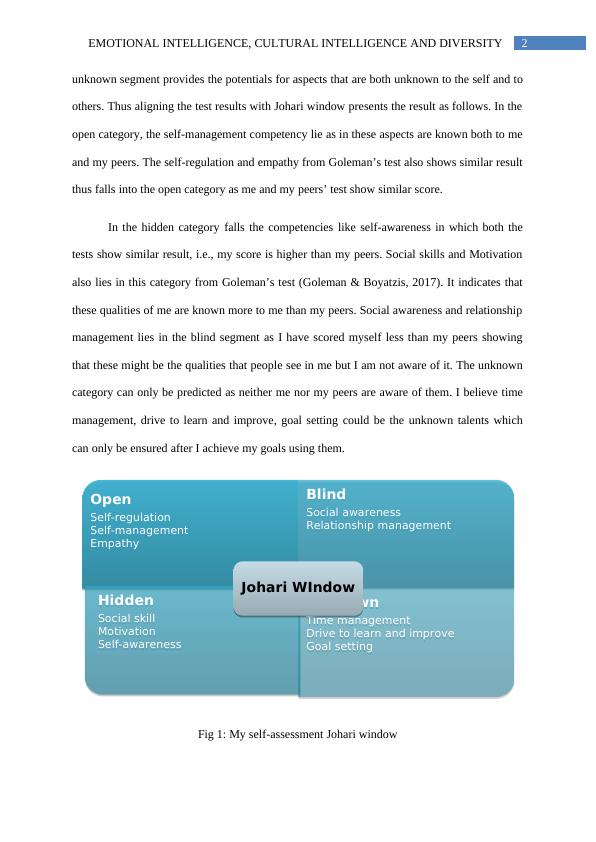
3EMOTIONAL INTELLIGENCE, CULTURAL INTELLIGENCE AND DIVERSITY
Source: Created by the author
Analysis of strengths and weaknesses
From the analysis of the results of the two tests and the Johari Window, I have
identified the potential threats and weaknesses (Nofriza, 2017). The strengths that I have
identified are self-regulation, self-management and empathy as well as competencies like
social skills, motivation and self-awareness. My weaknesses that I identify from the analysis
are social awareness and relationship management. The 1st quadrant of the Johari Window
contains the known or the apparent qualities of me. These can be considered as strengths as
these aspects are easily identifiable in me. Self-regulation is one of my key strengths as both
the tests find this to be known qualities.
Self-management and self-regulation are essentially same and comprises of five
components, self-control, transparency, adaptability, achievement orientation and initiative.
Self-awareness which is one of the strengths is necessary for self-regulation. There are three
components to it, emotional self-awareness, accurate self-assessment and self-confidence
leading to self-reflection. These strengths will help me in achieving my goals in future
provided that I am able to access the unknown potentials.
Empathy also is one of the weakness for me as I am more often unable to recognize
the emotions and feelings of others along with the perspectives that they are presenting. It is
one of the fundamental skills when it comes to managing people which leads to social skill
which is also a strength (Gunkel, Schlaegel & Taras, 2016). The weaknesses like social
awareness and relationship management could be problematic for me as they are also
essentially people skill and in order to be successful in future career developing these skills
are necessary. I also need to be aware of motivation as it appears on both quadrants and could
become possible barrier for my future.
Source: Created by the author
Analysis of strengths and weaknesses
From the analysis of the results of the two tests and the Johari Window, I have
identified the potential threats and weaknesses (Nofriza, 2017). The strengths that I have
identified are self-regulation, self-management and empathy as well as competencies like
social skills, motivation and self-awareness. My weaknesses that I identify from the analysis
are social awareness and relationship management. The 1st quadrant of the Johari Window
contains the known or the apparent qualities of me. These can be considered as strengths as
these aspects are easily identifiable in me. Self-regulation is one of my key strengths as both
the tests find this to be known qualities.
Self-management and self-regulation are essentially same and comprises of five
components, self-control, transparency, adaptability, achievement orientation and initiative.
Self-awareness which is one of the strengths is necessary for self-regulation. There are three
components to it, emotional self-awareness, accurate self-assessment and self-confidence
leading to self-reflection. These strengths will help me in achieving my goals in future
provided that I am able to access the unknown potentials.
Empathy also is one of the weakness for me as I am more often unable to recognize
the emotions and feelings of others along with the perspectives that they are presenting. It is
one of the fundamental skills when it comes to managing people which leads to social skill
which is also a strength (Gunkel, Schlaegel & Taras, 2016). The weaknesses like social
awareness and relationship management could be problematic for me as they are also
essentially people skill and in order to be successful in future career developing these skills
are necessary. I also need to be aware of motivation as it appears on both quadrants and could
become possible barrier for my future.
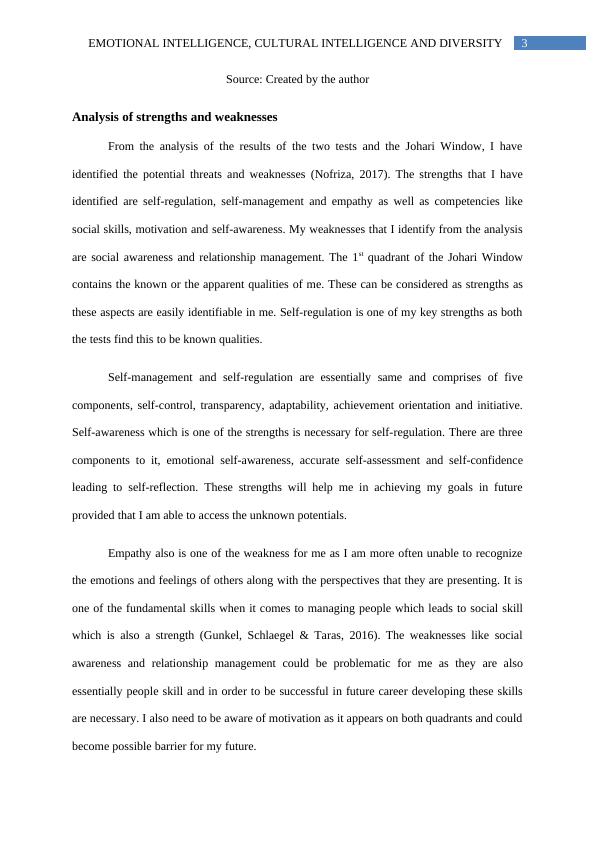
4EMOTIONAL INTELLIGENCE, CULTURAL INTELLIGENCE AND DIVERSITY
Skills and competency development for global citizenship
The first skill that I would want to develop for my future as global citizen is
motivation. The reason behind that is its presence both in hidden and blind quadrant. It seems
that this particular competency is compromised in some cases. Through the learning of the
Self Determination Theory I realized that motivation, especially, intrinsic motivation is
important in order to become a successful professional (Roth, Vansteenkiste & Ryan, 2019).
In order to be able to do the day to day jobs, one must motivate themselves using challenges,
curiosity, cooperation, competition, control, fantasy and recognition. I believe that it is the
lack of challenge and recognition that might be the reason why motivation seems to be a
problematic area for me. I would try to find more challenging jobs or roles, as well as jobs
that gives a certain sense of achievement or contribution to the bigger picture in order to feel
motivated.
I would like to develop my relationship management skills. In order to become a
global citizen, belonging to a world community and contributing to the values and practices
are necessary (Carson, Carson & Birkenmeier, 2016). Building relation is a major part of that
process. It includes seven competencies like visionary leadership, developing others,
influence, change catalyst, conflict management, building bonds and teamwork. All of these
are necessary people skills, which will help me in realizing my desired career and pursue a
leadership role in future. Empathy and social awareness in me also needs further
development. Empathy is one of the most important competency to become aware of others
emotions which is a necessary part of becoming global citizen.
Social awareness has two other components like organizational awareness and service
orientation, both necessary skill to serve in an organization (Saddiqui et al., 2018). In order to
develop these aspects, I would use my strengths like my self-regulation and self-awareness,
Skills and competency development for global citizenship
The first skill that I would want to develop for my future as global citizen is
motivation. The reason behind that is its presence both in hidden and blind quadrant. It seems
that this particular competency is compromised in some cases. Through the learning of the
Self Determination Theory I realized that motivation, especially, intrinsic motivation is
important in order to become a successful professional (Roth, Vansteenkiste & Ryan, 2019).
In order to be able to do the day to day jobs, one must motivate themselves using challenges,
curiosity, cooperation, competition, control, fantasy and recognition. I believe that it is the
lack of challenge and recognition that might be the reason why motivation seems to be a
problematic area for me. I would try to find more challenging jobs or roles, as well as jobs
that gives a certain sense of achievement or contribution to the bigger picture in order to feel
motivated.
I would like to develop my relationship management skills. In order to become a
global citizen, belonging to a world community and contributing to the values and practices
are necessary (Carson, Carson & Birkenmeier, 2016). Building relation is a major part of that
process. It includes seven competencies like visionary leadership, developing others,
influence, change catalyst, conflict management, building bonds and teamwork. All of these
are necessary people skills, which will help me in realizing my desired career and pursue a
leadership role in future. Empathy and social awareness in me also needs further
development. Empathy is one of the most important competency to become aware of others
emotions which is a necessary part of becoming global citizen.
Social awareness has two other components like organizational awareness and service
orientation, both necessary skill to serve in an organization (Saddiqui et al., 2018). In order to
develop these aspects, I would use my strengths like my self-regulation and self-awareness,
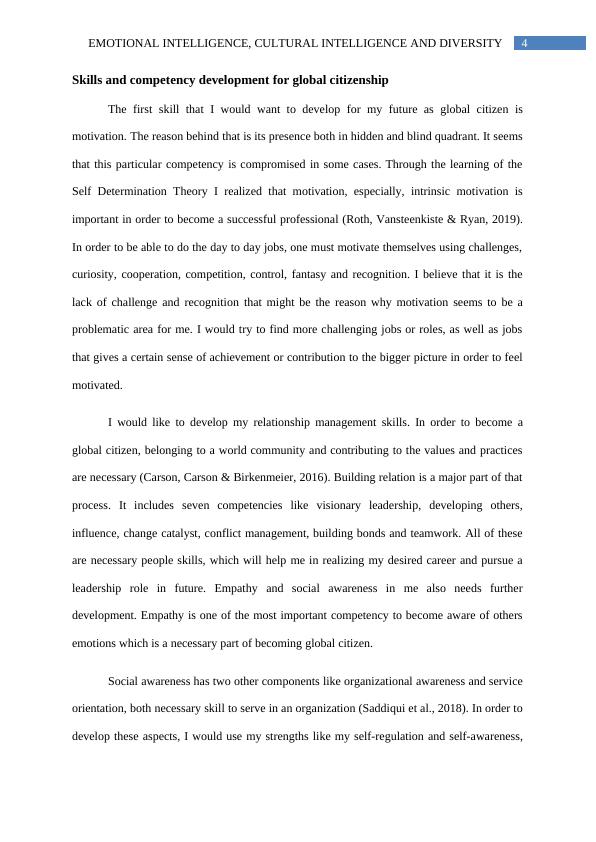
5EMOTIONAL INTELLIGENCE, CULTURAL INTELLIGENCE AND DIVERSITY
social skills like network building, in order to get better understanding about these
competencies. I would also use the course materials and activities to develop my
competencies further, seeking the help of the teachers and my peers. As people skill seems to
be the area of weakness, I would take active step in attentive listening, taking part in group
discussion and group work, contributing to team work and building larger network to
overcome my weaknesses and become a successful global citizen.
Conclusion
From the above discussion, it can be concluded that while I have some strengths, I
also have certain weaknesses that gives me the opportunity to develop myself further. The
analysis and understanding of my skills through Johari window has been quite effective for
me as I have been able to identify the areas that need further attention and the competencies
that I can use to develop those areas. Thus, in order to become a true global citizen, I would
develop my people skills and organizational skills using the strengths that I have along with
the insights of the course.
social skills like network building, in order to get better understanding about these
competencies. I would also use the course materials and activities to develop my
competencies further, seeking the help of the teachers and my peers. As people skill seems to
be the area of weakness, I would take active step in attentive listening, taking part in group
discussion and group work, contributing to team work and building larger network to
overcome my weaknesses and become a successful global citizen.
Conclusion
From the above discussion, it can be concluded that while I have some strengths, I
also have certain weaknesses that gives me the opportunity to develop myself further. The
analysis and understanding of my skills through Johari window has been quite effective for
me as I have been able to identify the areas that need further attention and the competencies
that I can use to develop those areas. Thus, in order to become a true global citizen, I would
develop my people skills and organizational skills using the strengths that I have along with
the insights of the course.
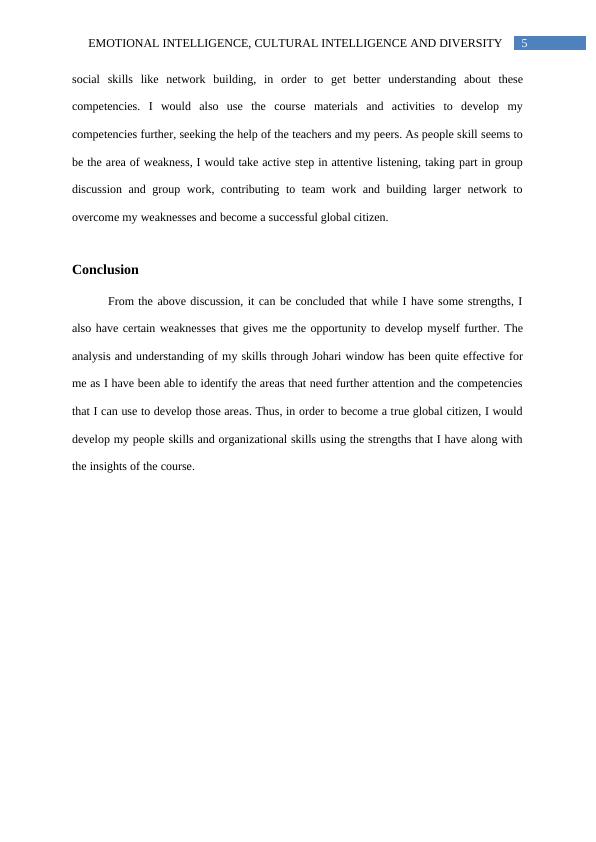
End of preview
Want to access all the pages? Upload your documents or become a member.
Related Documents
Emotional intelligence cultural intelligencelg...
|22
|1876
|11
Emotional Intelligence, Cultural Intelligence & Diversity: An Analysislg...
|8
|1773
|90
Emotional Intelligence, Cultural Intelligence and Diversity Analysis 2022lg...
|6
|1472
|15
Emotional Intelligence, Cultural Intelligence and Diversitylg...
|8
|2010
|52
Emotional Intelligencelg...
|9
|1871
|96
Emotional Intelligence, Cultural Intelligence and Diversity | Reportlg...
|11
|1431
|23
